William Yang Wang
DevOps-Gym: Benchmarking AI Agents in Software DevOps Cycle
Jan 27, 2026Abstract:Even though demonstrating extraordinary capabilities in code generation and software issue resolving, AI agents' capabilities in the full software DevOps cycle are still unknown. Different from pure code generation, handling the DevOps cycle in real-world software, including developing, deploying, and managing, requires analyzing large-scale projects, understanding dynamic program behaviors, leveraging domain-specific tools, and making sequential decisions. However, existing benchmarks focus on isolated problems and lack environments and tool interfaces for DevOps. We introduce DevOps-Gym, the first end-to-end benchmark for evaluating AI agents across core DevOps workflows: build and configuration, monitoring, issue resolving, and test generation. DevOps-Gym includes 700+ real-world tasks collected from 30+ projects in Java and Go. We develop a semi-automated data collection mechanism with rigorous and non-trivial expert efforts in ensuring the task coverage and quality. Our evaluation of state-of-the-art models and agents reveals fundamental limitations: they struggle with issue resolving and test generation in Java and Go, and remain unable to handle new tasks such as monitoring and build and configuration. These results highlight the need for essential research in automating the full DevOps cycle with AI agents.
Training LLMs with LogicReward for Faithful and Rigorous Reasoning
Dec 20, 2025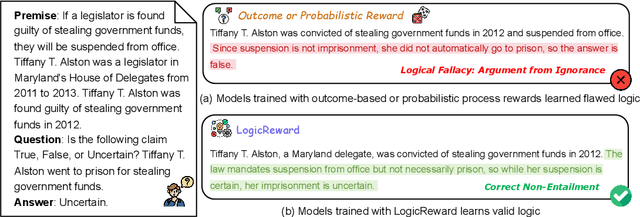
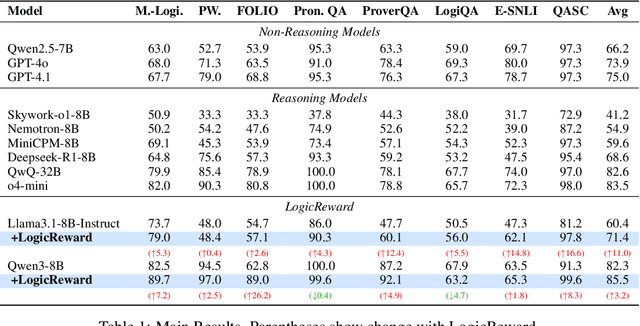
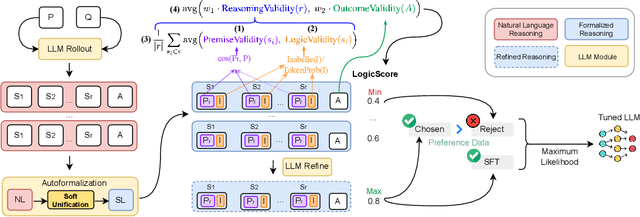

Abstract:Although LLMs exhibit strong reasoning capabilities, existing training methods largely depend on outcome-based feedback, which can produce correct answers with flawed reasoning. Prior work introduces supervision on intermediate steps but still lacks guarantees of logical soundness, which is crucial in high-stakes scenarios where logical consistency is paramount. To address this, we propose LogicReward, a novel reward system that guides model training by enforcing step-level logical correctness with a theorem prover. We further introduce Autoformalization with Soft Unification, which reduces natural language ambiguity and improves formalization quality, enabling more effective use of the theorem prover. An 8B model trained on data constructed with LogicReward surpasses GPT-4o and o4-mini by 11.6\% and 2\% on natural language inference and logical reasoning tasks with simple training procedures. Further analysis shows that LogicReward enhances reasoning faithfulness, improves generalizability to unseen tasks such as math and commonsense reasoning, and provides a reliable reward signal even without ground-truth labels. We will release all data and code at https://llm-symbol.github.io/LogicReward.
Dynamic Evaluation for Oversensitivity in LLMs
Oct 21, 2025Abstract:Oversensitivity occurs when language models defensively reject prompts that are actually benign. This behavior not only disrupts user interactions but also obscures the boundary between harmful and harmless content. Existing benchmarks rely on static datasets that degrade overtime as models evolve, leading to data contamination and diminished evaluative power. To address this, we develop a framework that dynamically generates model-specific challenging datasets, capturing emerging defensive patterns and aligning with each model's unique behavior. Building on this approach, we construct OVERBENCH, a benchmark that aggregates these datasets across diverse LLM families, encompassing 450,000 samples from 25 models. OVERBENCH provides a dynamic and evolving perspective on oversensitivity, allowing for continuous monitoring of defensive triggers as models advance, highlighting vulnerabilities that static datasets overlook.
LEDOM: An Open and Fundamental Reverse Language Model
Jul 02, 2025Abstract:We introduce LEDOM, the first purely reverse language model, trained autoregressively on 435B tokens with 2B and 7B parameter variants, which processes sequences in reverse temporal order through previous token prediction. For the first time, we present the reverse language model as a potential foundational model across general tasks, accompanied by a set of intriguing examples and insights. Based on LEDOM, we further introduce a novel application: Reverse Reward, where LEDOM-guided reranking of forward language model outputs leads to substantial performance improvements on mathematical reasoning tasks. This approach leverages LEDOM's unique backward reasoning capability to refine generation quality through posterior evaluation. Our findings suggest that LEDOM exhibits unique characteristics with broad application potential. We will release all models, training code, and pre-training data to facilitate future research.
MAGPIE: A dataset for Multi-AGent contextual PrIvacy Evaluation
Jun 25, 2025Abstract:The proliferation of LLM-based agents has led to increasing deployment of inter-agent collaboration for tasks like scheduling, negotiation, resource allocation etc. In such systems, privacy is critical, as agents often access proprietary tools and domain-specific databases requiring strict confidentiality. This paper examines whether LLM-based agents demonstrate an understanding of contextual privacy. And, if instructed, do these systems preserve inference time user privacy in non-adversarial multi-turn conversation. Existing benchmarks to evaluate contextual privacy in LLM-agents primarily assess single-turn, low-complexity tasks where private information can be easily excluded. We first present a benchmark - MAGPIE comprising 158 real-life high-stakes scenarios across 15 domains. These scenarios are designed such that complete exclusion of private data impedes task completion yet unrestricted information sharing could lead to substantial losses. We then evaluate the current state-of-the-art LLMs on (a) their understanding of contextually private data and (b) their ability to collaborate without violating user privacy. Empirical experiments demonstrate that current models, including GPT-4o and Claude-2.7-Sonnet, lack robust understanding of contextual privacy, misclassifying private data as shareable 25.2\% and 43.6\% of the time. In multi-turn conversations, these models disclose private information in 59.9\% and 50.5\% of cases even under explicit privacy instructions. Furthermore, multi-agent systems fail to complete tasks in 71\% of scenarios. These results underscore that current models are not aligned towards both contextual privacy preservation and collaborative task-solving.
Semantic Scheduling for LLM Inference
Jun 13, 2025Abstract:Conventional operating system scheduling algorithms are largely content-ignorant, making decisions based on factors such as latency or fairness without considering the actual intents or semantics of processes. Consequently, these algorithms often do not prioritize tasks that require urgent attention or carry higher importance, such as in emergency management scenarios. However, recent advances in language models enable semantic analysis of processes, allowing for more intelligent and context-aware scheduling decisions. In this paper, we introduce the concept of semantic scheduling in scheduling of requests from large language models (LLM), where the semantics of the process guide the scheduling priorities. We present a novel scheduling algorithm with optimal time complexity, designed to minimize the overall waiting time in LLM-based prompt scheduling. To illustrate its effectiveness, we present a medical emergency management application, underscoring the potential benefits of semantic scheduling for critical, time-sensitive tasks. The code and data are available at https://github.com/Wenyueh/latency_optimization_with_priority_constraints.
MacRAG: Compress, Slice, and Scale-up for Multi-Scale Adaptive Context RAG
May 10, 2025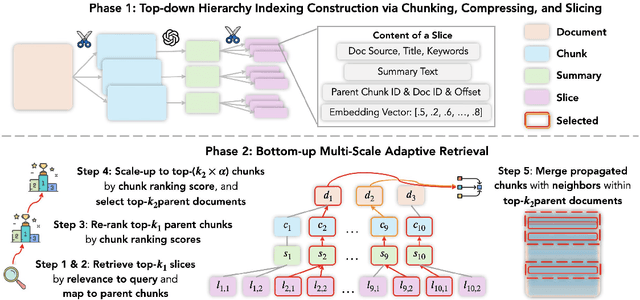
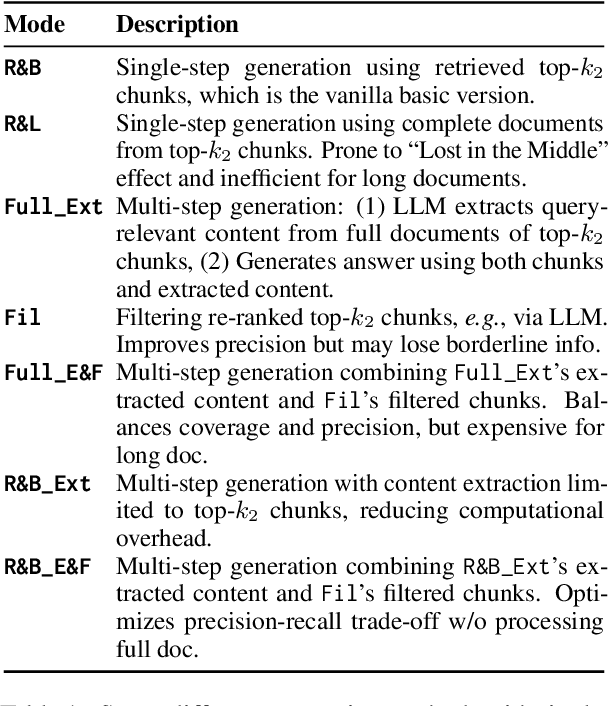
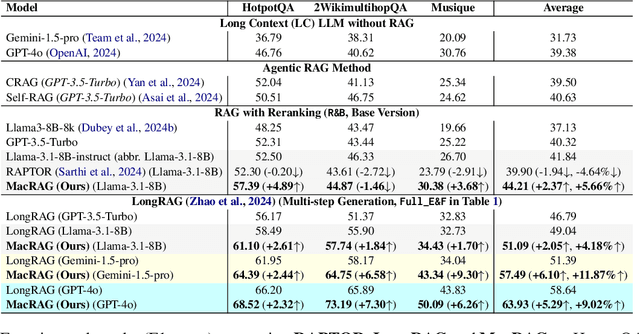

Abstract:Long-context (LC) Large Language Models (LLMs) combined with Retrieval-Augmented Generation (RAG) hold strong potential for complex multi-hop and large-document tasks. However, existing RAG systems often suffer from imprecise retrieval, incomplete context coverage under constrained context windows, and fragmented information caused by suboptimal context construction. We introduce Multi-scale Adaptive Context RAG (MacRAG), a hierarchical retrieval framework that compresses and partitions documents into coarse-to-fine granularities, then adaptively merges relevant contexts through chunk- and document-level expansions in real time. By starting from the finest-level retrieval and progressively incorporating higher-level and broader context, MacRAG constructs effective query-specific long contexts, optimizing both precision and coverage. Evaluations on the challenging LongBench expansions of HotpotQA, 2WikiMultihopQA, and Musique confirm that MacRAG consistently surpasses baseline RAG pipelines on single- and multi-step generation with Llama-3.1-8B, Gemini-1.5-pro, and GPT-4o. Our results establish MacRAG as an efficient, scalable solution for real-world long-context, multi-hop reasoning. Our code is available at https://github.com/Leezekun/MacRAG.
THOUGHTTERMINATOR: Benchmarking, Calibrating, and Mitigating Overthinking in Reasoning Models
Apr 17, 2025



Abstract:Reasoning models have demonstrated impressive performance on difficult tasks that traditional language models struggle at. However, many are plagued with the problem of overthinking--generating large amounts of unnecessary tokens which don't improve accuracy on a question. We introduce approximate measures of problem-level difficulty and demonstrate that a clear relationship between problem difficulty and optimal token spend exists, and evaluate how well calibrated a variety of reasoning models are in terms of efficiently allocating the optimal token count. We find that in general, reasoning models are poorly calibrated, particularly on easy problems. To evaluate calibration on easy questions we introduce DUMB500, a dataset of extremely easy math, reasoning, code, and task problems, and jointly evaluate reasoning model on these simple examples and extremely difficult examples from existing frontier benchmarks on the same task domain. Finally, we introduce THOUGHTTERMINATOR, a training-free black box decoding technique that significantly improves reasoning model calibration.
Do Larger Language Models Imply Better Reasoning? A Pretraining Scaling Law for Reasoning
Apr 04, 2025



Abstract:Large Language Models (LLMs) have demonstrated remarkable capabilities across a wide range of tasks requiring complex reasoning. However, the effects of scaling on their reasoning abilities remain insufficiently understood. In this paper, we introduce a synthetic multihop reasoning environment designed to closely replicate the structure and distribution of real-world large-scale knowledge graphs. Our reasoning task involves completing missing edges in the graph, which requires advanced multi-hop reasoning and mimics real-world reasoning scenarios. To evaluate this, we pretrain language models (LMs) from scratch solely on triples from the incomplete graph and assess their ability to infer the missing edges. Interestingly, we observe that overparameterization can impair reasoning performance due to excessive memorization. We investigate different factors that affect this U-shaped loss curve, including graph structure, model size, and training steps. To predict the optimal model size for a specific knowledge graph, we find an empirical scaling that linearly maps the knowledge graph search entropy to the optimal model size. This work provides new insights into the relationship between scaling and reasoning in LLMs, shedding light on possible ways to optimize their performance for reasoning tasks.
REALM: A Dataset of Real-World LLM Use Cases
Mar 24, 2025Abstract:Large Language Models, such as the GPT series, have driven significant industrial applications, leading to economic and societal transformations. However, a comprehensive understanding of their real-world applications remains limited. To address this, we introduce REALM, a dataset of over 94,000 LLM use cases collected from Reddit and news articles. REALM captures two key dimensions: the diverse applications of LLMs and the demographics of their users. It categorizes LLM applications and explores how users' occupations relate to the types of applications they use. By integrating real-world data, REALM offers insights into LLM adoption across different domains, providing a foundation for future research on their evolving societal roles. A dedicated dashboard https://realm-e7682.web.app/ presents the data.
 Add to Chrome
Add to Chrome Add to Firefox
Add to Firefox Add to Edge
Add to Edge